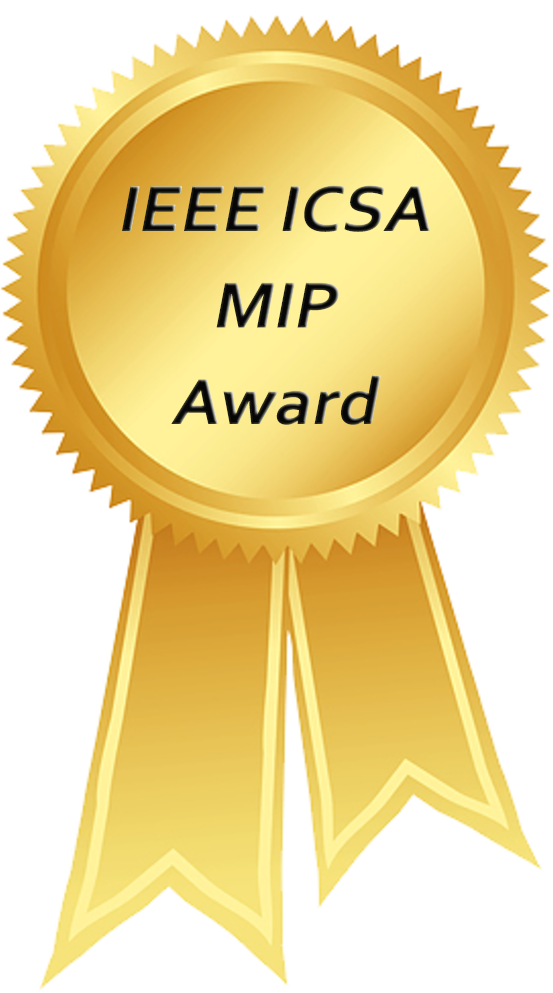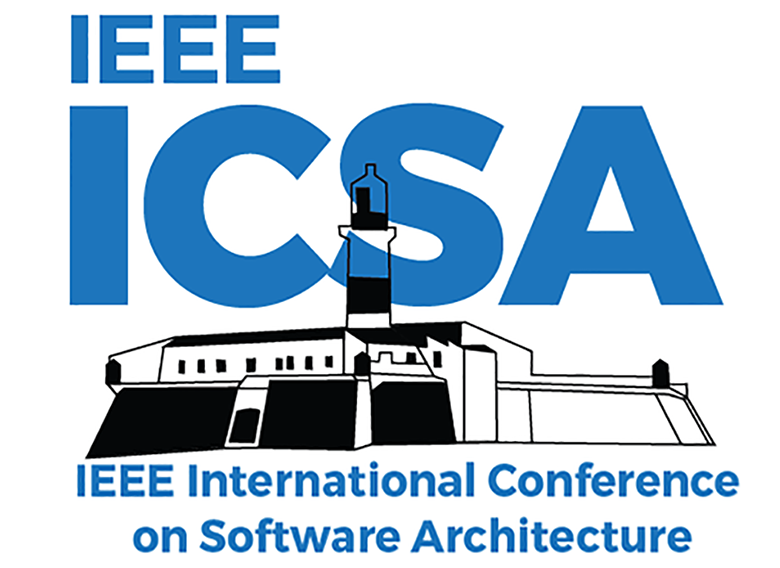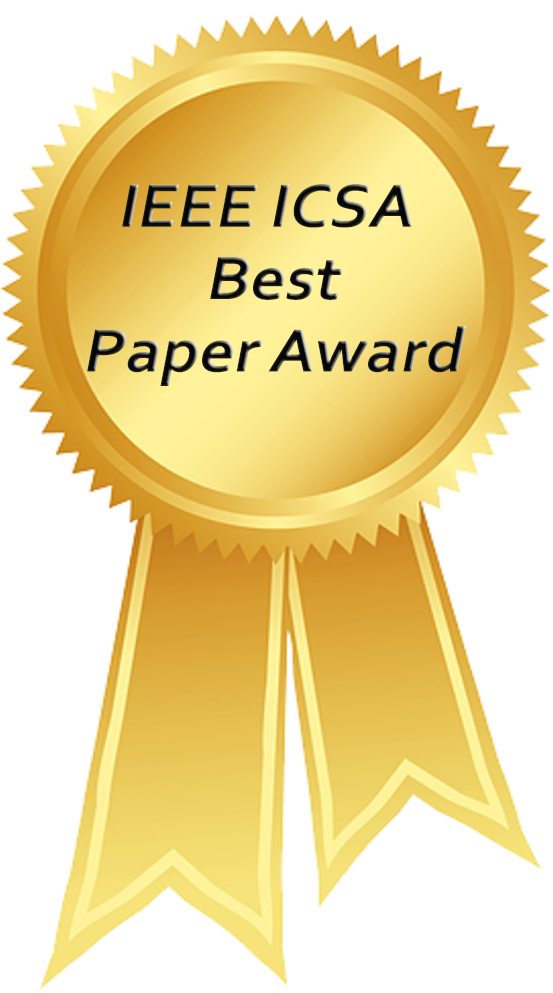Get Calendar (iCal): ICSA 2020 – Virtual Sessions
MONDAY |
|
|
Alpha room Tutorial 1: Enabling Industry 4.0 with Eclipse BaSyx (Thomas Kuhn, Frank Schnicke and Pablo Oliveira Antonino)Abstract: The fourth industrial revolution is mainly a software revolution. The end-to-end digitalization, and the flexibility of manufacturing and supply chains require revisiting concepts like Service Oriented Architectures (SOA) and Digital Twins, which are being considered the foundation of Industry 4.0, as well as developing new software and system architecture concepts. In this tutorial, we intend to discuss Industry 4.0 current trends and challenges that require active research by the software and systems architecture community, as well as architecture drivers (i.e., business drivers, quality & key functional requirements, and technical, organizational, & legal constraints) and architecture decisions that we have compiled from (i) the literature and (ii) consultancy and research projects in the field. Additionally, we intend to discuss how these architecture drivers and decisions are addressed by Eclipse BaSyx 1 , which is an open-source solution being actively developed in the context of the BaSys 4.02 series of projects that aims at supporting manufacturing companies and research institutions to architect Industry 4.0 solutions. Last, we also plan to run practical small sessions, where the tutorial participants can reason on architecture decisions and specific Industry 4.0 architecture scenarios, experiencing, then, the first steps to realize Industry 4.0 solutions. |
|
Beta room Tutorial 2: Modeling Microservices with DDD (Paulo Merson and Joseph Yoder)Abstract: Many have suggested using Domain-Driven Design (DDD) to help define the functional scope of microservices. But how to apply this idea in practice is not clear to everyone. DDD is a domain modeling technique created in the early 2000s. Microservices is an architecture style that became popular in 2015 as means to break software solutions into a set of independently deployed services. In this full-day tutorial we'll cover basic DDD concepts and discuss why and how DDD can help to create microservices with better availability, scalability, reliability, and modifiability. Using examples, we'll navigate from a domain model created using DDD to the design of both synchronous (REST-based) and asynchronous (reactive) microservices. We’ll explore five different microservice design scenarios around DDD aggregates, bounded contexts (BC), domain events and other strategies for inter-BC interaction. |
|
Gamma room Workshop 1: BlockArchOpening Session (09:00 - 09:10) Technical Session 1 - Blockchain for E-Health (09:10 - 10:10)
Technical Session 2 - Architecting Blockchain-based Applications (10:10 - 11:10)
Break (11:10 - 11:20) Technical Session 3 - Blockchain on Web Environment (11:20 - 12:00)
Session 4 (12:00 - 13:00)
|
|
Delta room Workshop 2: SESoS/WDESWorkshop Opening (09:00 - 09:10) Keynote - Thais Batista (Federal University of Rio Grande do Norte, Brazil) (09:10 - 10:20) Technical Session 1: Service-Based Architectures - Chair: Valdemar Graciano Neto (10:20 - 10:50)
Break (10:50 - 11:00) Technical Session 2: Systems-of-Systems - Chair: Elisa Yumi Nakagawa (11:00 - 11:50)
Technical Session 3: Ecosystems - Chair: Awdren Fontão (11:50 - 12:40)
Workshop Discussion: Towards a Research Agenda 2020-2030 (12:40 - 13:00) |
TUESDAY |
|
|
Alpha room Tutorial 3: Challenges and Approaches for the Assessment of Micro-Service Architecture Deployment Alternatives in DevOps (Alberto Avritzer)Abstract: The goal of this tutorial is to provide an overview of challenges and approaches for architecture/dependability assessment in the context of DevOps and microservices. Specifically, we present approaches that employ operational data obtained from production-level application performance management (APM) tools, giving access to operational workload profiles, architectural information, failure models, and security intrusions. We use this data to automatically create and configure architecture assessments based on models, load tests, and resilience benchmarks. The focus of this tutorial is on approaches that employ production usage, because these approaches provide more accurate recommendations for microservice architecture dependability assessment than approaches that do not consider production usage. We present an overview of (1) the state-of-the-art approaches for obtaining operational data from production systems using APM tools, (2) the challenges of dependability for DevOps and microservices, (3) selected approaches based on operational data to assess dependability. The architecture assessment focus of this tutorial is on scalability, resilience, survivability, and security. Particularly, we present a demo of the automated approach for the evaluation of a domain-based scalability and security metric assessment that is based on the microservice architecture ability to satisfy the performance requirement under load and/or intrusions. We illustrate the approach by presenting experimental results using a benchmark microservice architecture.
|
|
Beta room Workshop 3: SEH 2020Opening Session (09:00 - 09:05) Keynote: Health 4.0 - The 4.0 Wave in the Medical Domain by Dr. Pablo Oliveira Antonino, Fraunhofer Institute for Experimental Software Engineering, Germany (09:05 - 10:00) Technical Session 1 - Apps and Systems for Healthcare (10:00 - 10:50)
Break (10:50 - 11:00) Technical Session 2 - Compliance and conformity assessment, Data Quality (11:00 - 11:50)
Session 3 - Security and Data Mining: Technology applied for healthcare (11:50 - 12:40)
Research Agenda Discussion and Closing Session (12:40 - 13:00) |
WEDNESDAY |
|
09:00 - 09:20 (PST) |
Plenary room Opening Session Chair: Eduardo Almeida |
09:20 - 10:20 (PST) |
Plenary room Keynote: André van der Hoek, University of California |
10:20 - 10:30 (PST) |
|
10:30 - 11:30 (PST) |
Alpha room
|
|
Beta room
|
|
|
Gamma room
|
|
11:30 - 11:40 (PST) |
|
11:40 - 12:40 (PST) |
Alpha room
|
|
Beta room
|
|
12:40 - 13:00 (PST) |
Plenary room Chair: Ivica Crnkovic ICSA2020's Most Influential Paper Award 
|
THURSDAY |
|
09:00 - 10:00 (PST) |
Plenary room Keynote:
Tim Menzies, NC State University
|
10:00 - 10:10 (PST) |
|
| 10:10 - 11:30 (PST) |
Alpha room
|
|
Beta room
|
|
11:30 - 11:40 (PST) |
|
11:40 - 13:00 (PST) |
Alpha room
|
|
Beta room
|
|
FRIDAY |
|
09:00 - 10:00 (PST) |
Plenary room Building a bank outside-in: The challenges evolving Nubank to millions of customers and multiple products Chair: Paulo Merson |
10:00 - 10:10 (PST) |
|
| 10:10 - 11:30 (PST) |
Alpha room
|
11:30 - 11:40 (PST) |
|
11:40 - 12:40 (PST) |
Alpha room
|
12:40 - 13:00 (PST) |
Plenary room Closing Chair: Eduardo Almeida |

